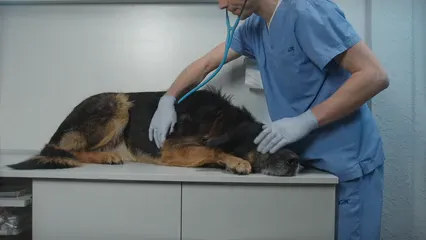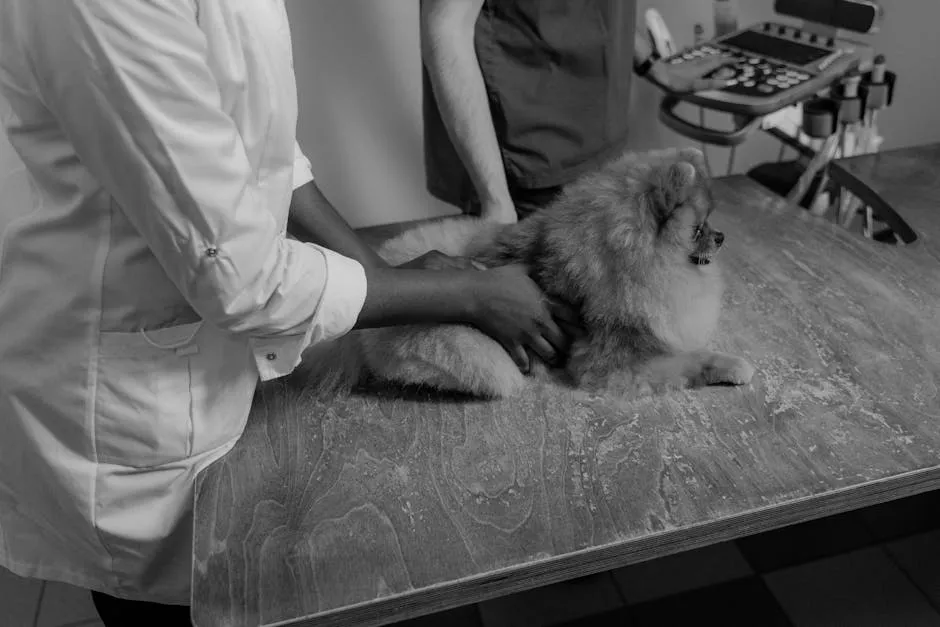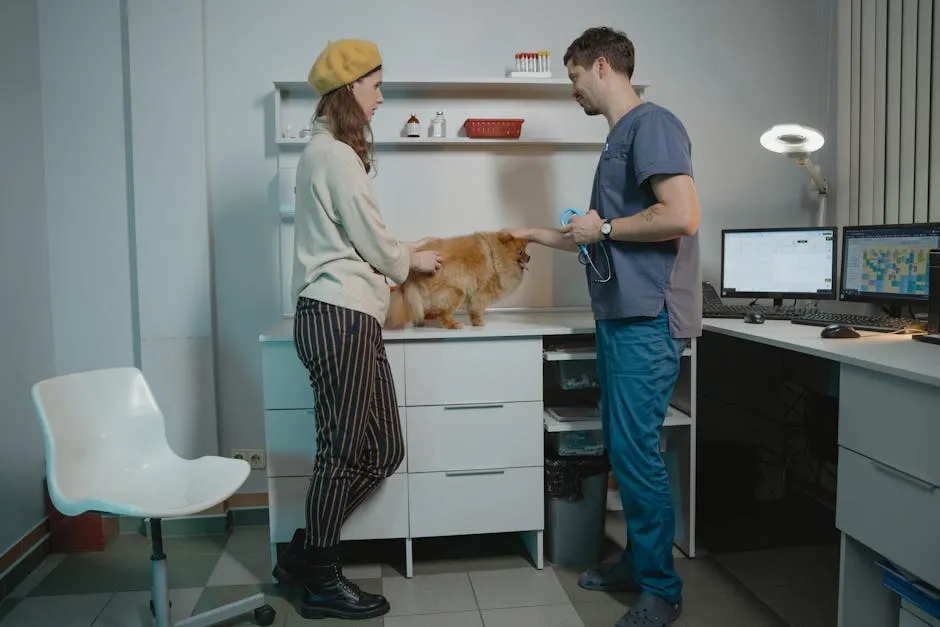What is Carprofen?
Carprofen is a non-steroidal anti-inflammatory drug (NSAID) specifically designed for dogs. Think of it as the trusty sidekick that swoops in to combat pain and inflammation. Approved for veterinary use, carprofen works by inhibiting certain enzymes that trigger inflammation, thus providing relief from various ailments.
This medication belongs to the propionic acid class of NSAIDs, similar to ibuprofen but tailored for canine physiology. It selectively targets cyclooxygenase-2 (COX-2) enzymes, meaning it reduces inflammation without causing as much gastrointestinal distress as other NSAIDs that affect both COX-1 and COX-2. In simpler terms, it’s the superhero your dog needs without the sidekick’s usual baggage!
Carprofen has been a staple in veterinary medicine since its approval in 1996. It’s primarily used to treat osteoarthritis and manage pain post-surgery. The magic happens with its ability to alleviate discomfort while ensuring your furry friend can still wag their tail without wincing in pain.
In terms of pharmacokinetics, carprofen is absorbed quickly, with peak plasma levels occurring within 1 to 3 hours after administration. The drug is metabolized mainly by the liver and is excreted through urine and feces. This means you can expect to see your pup feeling better within a couple of hours after taking their dose.
As with any medication, it’s important to follow your veterinarian’s guidelines closely. They will provide the correct dosage based on your dog’s weight and specific health needs. With carprofen, responsible pet ownership means keeping an eye on your furry friend for any possible side effects or unusual behaviors as they adjust to their new treatment.

Brand Names
Carprofen is marketed under several brand names, making it accessible for pet owners. Commonly recognized names include Rimadyl, Novox, Vetprofen, and Canidryl. Each brand offers variations in formulation, such as chewable tablets and injectables, allowing for flexibility in how you administer the medication to your dog. Always consult your veterinarian to determine which brand and form is most suitable for your pup’s unique situation.

How Does Carprofen Work?
Mechanism of Action
Carprofen operates by inhibiting cyclooxygenase (COX) enzymes, specifically COX-2, which play a crucial role in producing prostaglandins. These chemicals are responsible for promoting inflammation, pain, and fever. By blocking COX-2, carprofen effectively reduces the levels of these inflammatory mediators, resulting in decreased swelling and discomfort.
This selective inhibition is what sets carprofen apart from other non-steroidal anti-inflammatory drugs (NSAIDs). While some NSAIDs affect both COX-1 and COX-2, leading to gastrointestinal side effects, carprofen minimizes these risks. This makes it a popular choice among veterinarians for managing chronic pain, especially in conditions like osteoarthritis.
In practical terms, carprofen allows your dog to move more freely and comfortably, reducing the stiffness often seen in older or arthritic dogs. It’s like giving them a new lease on life—less limping, more tail wagging! The relief can often be noticed within just one to two hours of administration, making it a go-to for pain management.

Pharmacokinetics
Carprofen is rapidly absorbed when administered orally, achieving peak plasma concentrations in about 1 to 3 hours. This swift absorption means that relief can come quickly, which is fantastic news for your furry friend.
Once in the system, carprofen is highly protein-bound—up to 99%. This high level of binding helps maintain effective drug concentrations in the bloodstream. The liver metabolizes carprofen, and the resulting metabolites are primarily excreted via feces (70-80%) and urine (10-20%).
The elimination half-life of carprofen in dogs is approximately 8 hours, allowing for effective dosing twice daily. For dogs with compromised liver function or those on long-term carprofen therapy, regular veterinary check-ups are essential to monitor liver and kidney health. This monitoring helps catch any potential issues before they become serious.
In summary, carprofen’s mechanism of action and pharmacokinetics work together to provide effective pain relief while minimizing side effects, making it a cornerstone in canine pain management.

Uses of Carprofen in Dogs
Primary Uses
Carprofen is primarily prescribed for two main reasons in dogs: managing osteoarthritis and providing post-operative pain relief. Osteoarthritis is a common ailment, particularly in older dogs. This degenerative joint disease results in inflammation and pain, making movement difficult. Carprofen alleviates these symptoms, allowing dogs to regain mobility and enjoy their daily activities.
Post-surgery, many dogs experience significant pain and discomfort. Carprofen effectively manages this pain, helping your pup recover faster and return to their playful self. Whether it’s a dental procedure or an orthopedic surgery, carprofen aids in a smoother recovery process.

Additional Uses
Beyond its primary applications, carprofen can be helpful in treating other conditions. It can assist in managing infections that cause pain and inflammation, such as urinary tract infections (UTIs) or ear infections.
Moreover, carprofen is sometimes used for cancer-related pain. As dogs face the challenges of cancer, maintaining their comfort is crucial. Carprofen can help alleviate some of the discomfort associated with tumors or cancer treatments. Additionally, it can help control fever, providing a broader range of relief for various painful conditions.
In conclusion, carprofen’s versatility makes it an essential medication in veterinary practice. With its ability to manage arthritis, postoperative pain, and other painful conditions, carprofen plays a vital role in enhancing your dog’s quality of life.

Dosage Guidelines
Recommended Dosage
Determining the right dosage of carprofen for your dog is essential for effective pain management. The typical recommended dosage is approximately 2 mg per pound of body weight, administered once or twice daily. However, your veterinarian will tailor the dosage based on your dog’s specific condition and weight, ensuring optimal results.
Carprofen is available in various forms, including chewable tablets and injectable solutions. The chewable tablets are often easier for dogs to take, especially if they have a preference for tasty treats. Administering the medication with food is advisable, as it can help reduce the risk of gastrointestinal upset.
For larger dogs, dosages can vary, so it’s crucial to follow your veterinarian’s advice closely. If your dog is on long-term medication, periodic veterinary check-ups are necessary to monitor its effectiveness and any potential side effects.
In summary, understanding how to administer carprofen properly will lead to a happier, more comfortable dog. Always consult with a veterinarian for the most accurate and safe dosing recommendations.

Missed Dose Protocol
If your dog misses a dose of carprofen, don’t panic! Just administer the missed dose as soon as you remember. However, if it’s almost time for the next scheduled dose, skip the missed one and return to the regular dosing schedule. Double dosing can lead to serious complications, so never give two doses at once. Consistency is key, so try to keep a routine for your dog’s medication. Setting reminders on your phone or using a Dog Pill Organizer can help you stay on top of their dosing. If you’re ever unsure, don’t hesitate to contact your veterinarian for guidance. After all, a happy pup means a happy owner!

Common Side Effects
Carprofen is generally well-tolerated by dogs, but it’s not without its quirks. Some common side effects can pop up, and they usually target the gastrointestinal tract. Think of it as your dog’s way of saying, “Hey, I’m not a fan of this!” You might notice your furry friend experiencing:
- Vomiting: Sometimes it’s just a hairball, but carprofen can be the culprit too.
- Diarrhea: A loose stool or two can happen. Just don’t let it become a trend!
- Lack of Appetite: If your pup suddenly decides their food looks less appealing, keep an eye on them.
- Constipation: On the flip side, some dogs might have trouble keeping things moving.
- Lethargy: If your pup seems more snoozy than usual, it might be a side effect.
These effects are usually mild and temporary. However, if they persist or worsen, it’s time to consult your vet. Remember, it’s always better to be safe than sorry!

Serious Side Effects
While most dogs handle carprofen like champs, some may encounter serious side effects. It’s crucial to be vigilant! Here are the major red flags to watch for:
- Severe Vomiting or Diarrhea: If your dog’s vomit or stool turns bloody, that’s a definite reason to call your vet.
- Increased Thirst and Urination: If your pup seems to have a newfound interest in the water bowl, it could signal something amiss.
- Pale Gums or Jaundice: Yellowing of the skin or eyes means your dog might be dealing with liver issues.
- Severe Lethargy: Sure, dogs love to nap, but if they’re not getting up at all, that’s concerning.
- Incoordination or Seizures: If your dog is wobbling or having seizures, it’s an emergency.
These serious side effects can arise unexpectedly. If you notice any of these symptoms, contact your veterinarian immediately. It’s always best to err on the side of caution!

What to Watch For
Monitoring your pup while they’re on carprofen is essential. Keep an eye out for any unusual behavior or symptoms that might require immediate veterinary consultation. Some signs to watch for include:
- Persistent vomiting or diarrhea, especially if it’s bloody.
- Sudden changes in drinking or urination habits.
- Unexplained lethargy or weakness.
- Jaundice, indicated by yellowing of the skin, gums, or eyes.
- Behavioral changes, such as increased aggression or anxiety.
If any of these symptoms pop up, don’t hesitate to reach out to your vet. Quick action can make all the difference in ensuring your dog stays happy and healthy!

Cautionary Use
When it comes to carprofen for dogs, caution is the name of the game. Some pups need extra TLC when it comes to their medication. For instance, older dogs often wear a badge of honor for their advanced years. However, this badge can also come with health complications. Senior dogs may have weakened kidneys or liver function, making them sensitive to medications like carprofen. Regular check-ups are essential to monitor their health and adjust dosages accordingly.
Pregnant and nursing dogs are another group requiring careful consideration. While carprofen works wonders for pain relief, its effects on developing puppies remain a mystery. To be on the safe side, avoid using carprofen in these situations unless your veterinarian gives the green light. After all, puppies deserve a good start in life, free from unnecessary risks!
Dehydrated dogs? They should also be approached with caution. Lack of hydration can lead to kidney issues, and carprofen can exacerbate this problem. Always ensure your furry friend has access to fresh water before administering medication.
Additionally, dogs with pre-existing conditions, such as liver or kidney disease, should be closely monitored when on carprofen. The last thing you want is to send your pup on a health rollercoaster. If your dog has a history of gastrointestinal problems, keep an eye out for signs of distress.
In summary, while carprofen is a fantastic tool for managing pain, certain situations require a careful approach. Always consult your veterinarian before starting treatment, especially if your dog falls into one of these categories. Your pup’s health and happiness depend on it!

Potential Interactions
When it comes to mixing medications, it’s crucial to know which combinations can lead to trouble. Carprofen interacts with a variety of drugs, and being informed is half the battle. First and foremost, avoid combining carprofen with other non-steroidal anti-inflammatory drugs (NSAIDs). Mixing these medications can increase the risk of gastrointestinal issues, such as ulcers or bleeding. This includes common NSAIDs like aspirin, ibuprofen, and naproxen.
Corticosteroids are another group to watch out for. When paired with carprofen, these can exacerbate gastrointestinal side effects. If your dog is on steroids, it’s best to consult your vet before introducing carprofen to the mix.
Anticoagulants, or blood thinners, also deserve a mention. Medications like warfarin can lead to increased bleeding when used with carprofen. If your pup is on blood thinners, be sure to keep your vet in the loop about any new medications.
ACE inhibitors, commonly prescribed for heart conditions, may also interact negatively with carprofen. Medications like enalapril and benazepril can further strain the kidneys, especially when combined with NSAIDs.
Other medications that could potentially interact include certain diuretics, insulin, and some chemotherapy drugs. Always inform your veterinarian about any medications your dog is taking, including over-the-counter products and supplements.
In summary, while carprofen can be a lifesaver for managing pain and inflammation, it’s essential to tread carefully when it comes to drug interactions. Keeping your veterinarian informed will ensure your furry friend stays safe and healthy.

Safe Combinations
While some medications should be kept at a distance from carprofen, there are safe combinations worth noting. For instance, gabapentin can be an excellent companion to carprofen. This combination may enhance pain relief, especially for dogs with chronic pain conditions.
Tramadol is another pain management option that can work well alongside carprofen. It offers additional analgesic effects without adding significant risk. Always consult your veterinarian for the appropriate dosages and timings when combining these medications.
Benadryl, used for allergies, can also be safely administered with carprofen. This duo can help manage allergic reactions while alleviating pain. Always check with your vet to confirm that this combination is right for your pup.
Lastly, trazodone can be used for anxiety or post-surgery calmness and is generally safe with carprofen. However, it’s essential to monitor your dog’s response to this combination closely.
In conclusion, while there are medications to avoid with carprofen, several can be safely used alongside it. Always discuss any potential combinations with your veterinarian to ensure your dog’s health and comfort.

Veterinary Monitoring
Monitoring your dog while they’re on carprofen is vital. Regular veterinary check-ups should be part of your routine. This is especially true for dogs on long-term carprofen therapy. Your vet will likely recommend baseline blood tests before starting treatment. These tests help assess liver and kidney function, ensuring your pup is fit for medication.
After starting carprofen, follow-up bloodwork is usually advised within 2 to 4 weeks. This helps catch any early signs of trouble. If everything looks good, you may only need to check again every 3 to 6 months. However, if your dog shows any unusual symptoms, don’t wait for the next scheduled check-up—call your vet right away!
In addition to blood tests, keep an eye on your dog at home. Look out for any signs of distress, such as vomiting, diarrhea, or changes in appetite. Catching these issues early can be crucial for your dog’s health.
Overall, regular veterinary monitoring is essential for dogs on long-term carprofen therapy. Your veterinarian is your best ally in ensuring your pup stays happy and healthy while managing pain effectively.

Long-Term Use Considerations
When your dog starts on carprofen, monitoring is key. This isn’t just about giving the medication and hoping for the best. Long-term use necessitates regular check-ins with your veterinarian. Why? Well, carprofen can have effects on your dog’s liver and kidneys, especially when taken over extended periods.
Your vet will likely recommend baseline blood tests before starting treatment. These tests help establish your dog’s normal liver and kidney function. Once carprofen therapy begins, follow-up tests are crucial. Typically, these should happen about 2 to 4 weeks later, then every 3 to 6 months. This way, you can catch any potential issues early on.
Additionally, keep an eye on your dog at home. Are they more lethargic than usual? Is there a change in appetite or drinking habits? These subtle signs can indicate that something isn’t right. If you notice unusual symptoms, don’t hesitate to reach out to your vet. Remember, maintaining your dog’s health while on carprofen is a team effort between you and your veterinarian.
Signs of Overdose
Overdosing on carprofen is a serious concern, and recognizing the signs is crucial. Symptoms can vary, but common indicators include vomiting—especially if it’s bloody—diarrhea, or black, tarry stools. Your dog may also seem lethargic, uncoordinated, or even experience seizures. If your pup suddenly becomes excessively thirsty or urinates more frequently, this may be a red flag.
In rare cases, an overdose can lead to severe liver damage, which can manifest as jaundice—yellowing of the skin or eyes. If you notice any of these symptoms, it’s essential to act quickly. Contact your veterinarian immediately for guidance. Early intervention can make a significant difference in your dog’s outcome.

Action Steps in Case of Emergency
If you suspect your dog has overdosed on carprofen, don’t panic—but do act fast. First, gather any remaining medication to provide details to your veterinarian. Next, contact your vet or an animal poison control center for specific advice tailored to your situation.
If your veterinarian is unavailable, take your dog to the nearest veterinary emergency clinic. They will likely administer activated charcoal to limit further absorption of the drug in the system. Your pup may require intravenous fluids to help flush out the medication and support kidney function.
Be proactive! Keep the carprofen packaging or prescription information handy. This information will help the veterinary team understand what they’re dealing with. Remember, the quicker the response, the better the chances of a positive outcome for your furry companion.
Conclusion
Carprofen is essential for managing your dog’s pain and inflammation. It can truly improve their quality of life. However, it’s crucial to maintain a close relationship with your veterinarian. Regular monitoring ensures safe and effective use of this medication. Always keep an eye on your pup for any changes, and don’t hesitate to reach out to your veterinarian with concerns.
For natural alternatives and additional options for managing your dog’s arthritis pain, check out this article on natural remedies for dog arthritis pain relief.
FAQs
How quickly does carprofen work in dogs?
Carprofen typically begins to work within one to two hours after administration. However, the full effect may take longer, especially for chronic conditions like osteoarthritis.
Can carprofen be used in cats or other animals?
Carprofen is primarily designed for dogs. While it may be used off-label in other species, such as horses, it is not recommended for cats due to potential adverse reactions.
Is carprofen safe for long-term use?
Generally, carprofen is safe for long-term use, but regular veterinary monitoring is essential. This helps to identify any potential side effects, especially concerning liver and kidney function.
What should I do if my dog has an adverse reaction?
If you notice any unusual behaviors or symptoms after administering carprofen, contact your veterinarian immediately. Quick action can prevent serious complications and ensure your dog’s safety.
Please let us know what you think about our content by leaving a comment down below!
Thank you for reading till here 🙂
As a responsible dog owner, it’s essential to have your bases covered. Consider investing in a Dog First Aid Kit for emergencies. You never know when your furry friend might need some extra care!
And let’s not forget about hydration! Keep your pup refreshed on the go with a Dog Water Bottle. Hydration is key to keeping their tail wagging!
For outdoor adventures, an Adjustable Dog Harness can provide comfort and security. Happy walks await!
All images from Pexels





